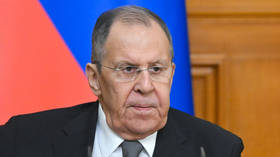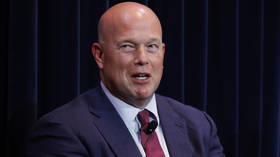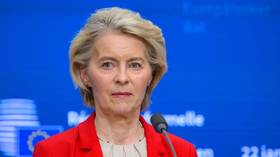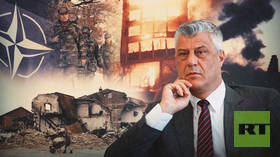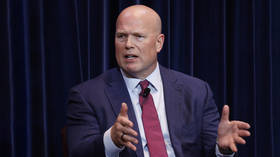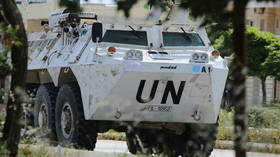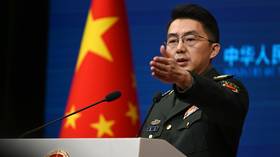Gas dispute close to end
Russia and Ukraine are due to sign a gas deal on Monday, which will allow the two sides to resume transit of Russian fuel to European customers.
As part of the agreement made on Saturday, Ukraine will enjoy a 20 % discount to the market price it pays for gas in 2009.
And by 2010 both countries will switch to full market price.
Tough talks
These talks weren’t easy – Timoshenko admitted, when the two prime-ministers came out to address to the media after hours of negotiations that didn't reach a conclusion until long after midnight.
Until the very last moment there were doubts just how much authority Timoshenko had to speak on behalf of Ukraine.
“I hope she has a mandate, Yushchenko reassured me they have the same position,” Russia’s President Dmitry Medvedev said earlier on Saturday.
The whole week conflicting statements were coming from the president and the prime-minister in Kiev. President Yushchenko refused to take part in the crisis energy conference in Moscow, Timoshenko readily took his place.
Understanding achieved
“In the course of our negotiations we have managed to achieve an understanding that Russia and Ukraine will switch to the European pricing formula in our natural gas trade.”
“At the same time in 2009 we'll make a 20% discount for Ukrainian partners – on the condition that Russia retains a discounted tariff for the transit of its gas to Europe through Ukraine’s territory in 2009 – that is the same tariff paid in 2008.”
“At the same time we have agreed that starting from January 1, 2010 we'll completely switch to European pricing formula both for gas supply and for transit,” Putin said following the talks.
“Indeed, our talks were not easy, but we were able to reach an agreement, which will allow us to sign all the contract papers. We have instructed Naftogas and Gazprom chief executives to prepare all the paperwork no later then Monday according to the understandings we reached in our talks today”.
“Also immediately after all the papers are signed all gas supplies to Europe will be fully restored,” Timoshenko agreed, adding that “the day was very fruitful, and the summit that convened today yielded results”.
“The Ukrainian side has assured us that the transit will be restored in the nearest future,” Putin concluded.
No gas since January 7
On January 7 2009, Ukraine shut all four pipelines that send gas to Europe.
A fifth of Europe's gas comes from Russia through Ukraine. Eighteen countries have either run out or are running low on the vital fuel. Households are suffering without heat in severe winter weather, businesses and plants have been forced to shut-down. The millions of citizens affected has made this a political crisis in the European Union.
Europe's dependence on Russian gas
Chronology of Russia-Ukraine gas war
The current gas cuts are the culmination of a long gas war between Russia and Ukraine, RT looks back at its latest chapter, starting back in October 2007 and the ongoing crisis, the effect of which is now being felt all around Europe.
Gas war chronology
Taking sides with pipelines
Before that Ukraine was stealing the Russian gas bound for European consumers, according to Gazprom and the results of an independent monitoring by a national resource analysts’ group from Switzerland. After that Russia made a decision to stop gas supplies via Ukraine to prevent the illegal siphoning.
Ukraine also insists Russia should supply ‘process gas’ (maintenance gas needed to keep the fuel flowing through the pipes) before it can guarantee the uninterrupted transit of supplies to Europe. However, Gazprom dismisses the idea, saying Ukraine has to pay for the gas or buy it elsewhere.
European consumers just want to get the gas flowing again.
“If the gas doesn’t flow again, we will have to look point by point at our relations with Russia and Ukraine and assess whether we can continue to do business as usual in these circumstances,” EU representative Johannes Leitenberger said.
Sharing the responsibility
Europe might finally warm-up, but there still likely to be a chill in Brussels.
Some Western countries accused Russia of using gas a political tool. Russian officials believe Moscow and Europe are being held hostage to the leadership crisis in Ukraine.
“This margin in the price of Russian gas that gets into Ukraine and the selling price on the internal Ukrainian market is approximately $14 million a day, or at least it was last year. I believe that no one in the world would dare to call this sum unattractive. I'm sure in the conditions of economic hardship in Ukraine there are more than enough people who are willing to fight for this sum of money to the end, and this is the battle we are witnessing right now,” Konstantin Kosachev, head, State Duma’s Foreign Affairs Committee.
Even before Putin and Timoshenko struck their deal, President Medvedev was warning that a resolution to this crisis would not be grounds to relax.
“This crisis showed that the current mechanisms do not work we need a new system,” he warned.
The Kremlin is now pushing forward an idea of mutual responsibility, in order to secure the interests of Europe as well as its own.
After the collapse of the USSR,Ukraine has enjoyed subsidised prices for gas. Gazprom says for years it has paid for European energy security out of its own pocket now it wants Europe to share the responsibility.


